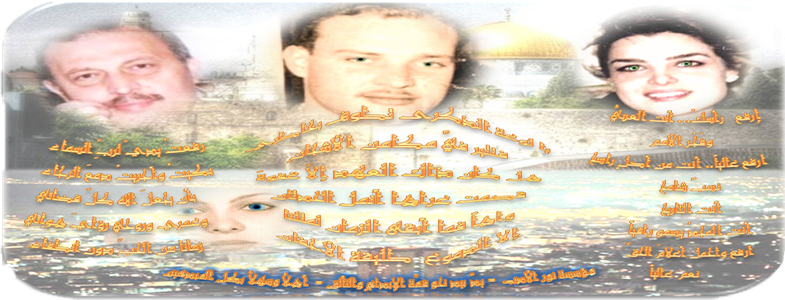 |
 |
|||||||
|
||||||||
|
||||||||
 اهداءات نور الأدب
اهداءات نور الأدب |
|
|
|
|||||||
|
| Palestinian issue The massacre committed by Israelis against the Arab people in Palestine |
 |
|
|
أدوات الموضوع |
|
|
|
رقم المشاركة : [1] | |
|
مديرة الموقع المؤسس - إجازة في الأدب ودراسات عليا في التاريخ - القصة والمقالة والنثر، والبحث ومختلف أصناف الأدب - مهتمة بتنقيح التاريخ - ناشطة في مجال حقوق الإنسان
            
|
Israel vows to continue war on Gaza
[align=left] Israel has warned that the onslaught in the Gaza Strip could last for "weeks" as the fourth consecutive day of aerial attacks targeted several Hamas government buildings. Around 350 people have been killed, many of them civilians, and local hospitals have warned they are unable to cope with any more casualties. Palestinian medical workers said at least 10 people had died in the latest raids on Tuesday, with security guards and civilians among those killed. But Israel said there would be no let up until the threat of Palestinian rockets attacks from the Gaza Strip had been removed. "There is no room for a ceasefire," Meir Sheetrit, Israel's interior minister, said. "The government is determined to remove the threat of [rocket] fire on the south. "Therefore the Israeli army must not stop the operation before breaking the will of Palestinians, of Hamas, to continue to fire at Israel." Four Israeli citizens have been killed by missiles fired from Palestinian positions since the offensive began on Saturday. Military preparations The Israeli army has been massing infantry and armoured forces along the border amid increasing fears that a ground invasion is planned. Matan Vilnai, Israel's deputy defence minister, said the military "has made preparations for some long weeks of action". On Monday, areas of the border were declared "closed military zones" and thousands of reservists have been called up by the Israeli military. "The ground forces are ready," Avital Leibovitz, an Israeli military spokeswoman, said on Tuesday. "The option exists. It is possible that we will apply it but for the moment we are only hitting from the air and the sea." Al Jazeera's Ayman Mohyeldin, reporting from Gaza Strip, said that the confirmation that naval vessels were now launching attacks was a further widening of the offensive. "We undertsand they are targeting buildings and various other targets throughout Gaza," he said. Mohyeldin said that a ground offensive would worsen the humanitarian situation for Gazans. "A ground offensive will mean urban warfare, close proximity fighting from street-to-street ... Gaza is so densely-populated that ultimately in that kind of operation the civilian population will find themselves caught in the middle," he said. More than 1,600 Palestinians have already been wounded in the assault and hospital are running out medicines and other products needed to treat them. Ceasefire call Ban Ki-Moon, the UN secretary-general, has added his voice to calls for an end to the violence. Speaking at UN headquarters in New York on Monday, he said both sides should end the fighting and said regional powers should do more to help resolve the crisis. "All this must stop," Ban told a press conference. "Both Israel and Hamas must halt their acts of violence and take all necessary measures to avoid civilian casualties. A ceasefire must be declared immediately. They must also curb their inflammatory rhetoric." Speaking to Al Jazeera, Tzipi Livni, the Israeli foreign minister, said the Israeli offensive was aimed at Hamas and not the Palestinian people, urging civilians to leave for safer places away from places close to Hamas infrastructure. "We tried to avoid this. You know that Israel accepted the truce that was initiated by the Egyptians in order to create peace and quiet. We adopted the truce. What we got in return? We got in return daily attacks, we got in return smuggling of weapons to Gaza Strip with long-range [capabilities]," she said. Support for Israel came from the US, with the White House saying Hamas must halt cross-border rocket fire. "In order for the violence to stop, Hamas must stop firing rockets into Israel and agree to respect a sustainable and durable ceasefire," Gordon Johndroe, a White House spokesman said. Aljareera.net [/align] نور الأدب (تعليقات الفيسبوك) |
|
|
|

|
|
 |
| مواقع النشر (المفضلة) |
«
الموضوع السابق
|
الموضوع التالي
»
| الذين يشاهدون محتوى الموضوع الآن : 1 ( الأعضاء 0 والزوار 1) | |
|
|
 المواضيع المتشابهه
المواضيع المتشابهه
|
||||
| الموضوع | كاتب الموضوع | المنتدى | مشاركات | آخر مشاركة |
| Israel Invades Gaza Because It Can | هدى نورالدين الخطيب | Palestinian issue | 1 | 07 / 08 / 2014 44 : 05 PM |
| How Israel brought Gaza to the brink of humanitarian catastrophe | عبدالله الخطيب | Palestinian issue | 0 | 12 / 01 / 2009 11 : 01 AM |
| St op the Massacre in Gaza – Boycott Israel Now | نصيرة تختوخ | Palestinian issue | 0 | 11 / 01 / 2009 07 : 06 PM |
| From Gaza to the world:Blogging Live From Gaza | نصيرة تختوخ | Palestinian issue | 0 | 06 / 01 / 2009 32 : 08 AM |
| Israel unleashes a massacre in Gaza .By Larry Everst | نصيرة تختوخ | Palestinian issue | 0 | 02 / 01 / 2009 36 : 02 AM |
الساعة الآن 03 : 06 PM
|
|













